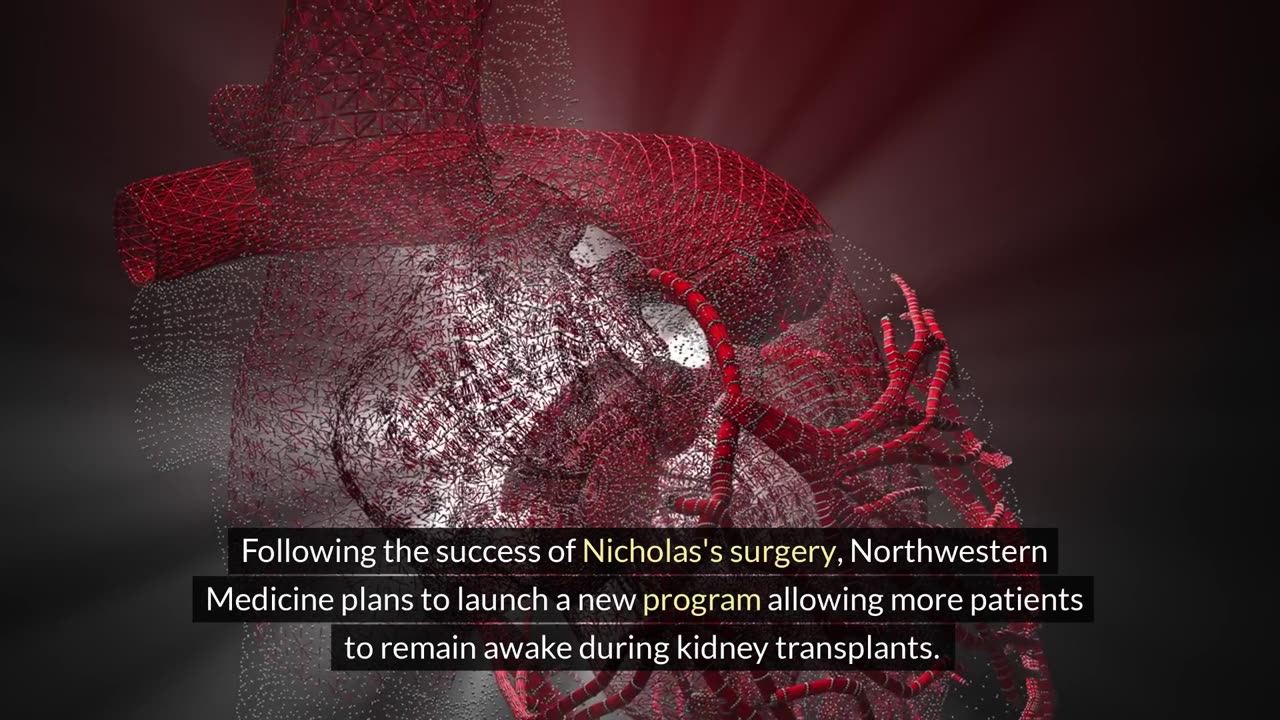Premium Only Content

Awake and Aware: The Revolutionary Kidney Transplant Changing Lives
A Medical Marvel Unveiled
Imagine undergoing a major surgery while fully awake, witnessing the remarkable process firsthand. This might sound like something out of a sci-fi movie, but for John Nicholas, a 28-year-old Chicago resident, it was his reality. Nicholas underwent a groundbreaking kidney transplant while awake, marking a first-of-its-kind success for Northwestern Medicine. This extraordinary procedure not only redefines the patient experience but also promises to revolutionize the field of organ transplantation.
## A New Frontier in Surgery: The Awake Kidney Transplant
### The Groundbreaking Procedure
On May 24, John Nicholas became the first patient to undergo an awake kidney transplant at Northwestern Medicine. Unlike traditional transplants that require general anesthesia, Nicholas's procedure was performed using spinal anesthesia, similar to what is administered during a cesarean section. This innovative approach allowed Nicholas to remain conscious throughout the surgery, experiencing a milestone in medical history firsthand.
### The Benefits of Spinal Anesthesia
Dr. Satish Nadig, the transplant surgeon and director of Northwestern Medicine's transplant center, explained the advantages of this approach. By avoiding general anesthesia, the risks associated with it, such as respiratory complications and longer recovery times, are significantly reduced. Furthermore, the use of spinal anesthesia can shorten hospital stays, as demonstrated by Nicholas, who was discharged just 24 hours after the surgery.
### A Patient's Perspective
For Nicholas, the experience was surreal yet painless. "At one point during surgery, I recall asking, ‘Should I be expecting the spinal anesthesia to kick in?’ They had already been doing a lot of work and I had been completely oblivious to that fact," he recounted. Despite being slightly sedated for comfort, Nicholas was fully aware of the proceedings and even got a glimpse of his new kidney before it was placed inside his body.
## The Path to a New Kidney: John Nicholas's Journey
### Battling Crohn's Disease
Nicholas's health challenges began at 16 when he was diagnosed with Crohn's Disease, a chronic inflammatory bowel condition. Over the years, this disease took a toll on his kidneys, leading to declining kidney function. By 2022, his condition had worsened, necessitating the search for a kidney donor.
### The Unlikely Donor: A True Friend
Initially, Nicholas's mother planned to donate her kidney, but her diagnosis of breast cancer put an end to those plans. In an extraordinary display of friendship and support, Pat Wise, a 29-year-old friend from Indiana, stepped up to donate his kidney. "We always called ourselves ‘ride or die’ friends, and this example shows that we have each other’s backs," Nicholas said, expressing his profound gratitude. This act of selflessness not only saved Nicholas's life but also strengthened the bond between the two friends.
### Life After Transplant
Post-surgery, Nicholas experienced a swift recovery, attributed to the novel surgical approach. Unlike the typical two to three-day hospital stay following a kidney transplant, Nicholas was back on his feet in just a day. This rapid recovery underscores the potential of awake transplants to improve patient outcomes and enhance the overall transplant experience.
## The Medical Team's Perspective: Simplicity and Innovation
### Dr. Satish Nadig's Vision
Dr. Satish Nadig's pioneering vision for awake kidney transplants stems from a desire to minimize risks and enhance patient recovery. By keeping patients awake, the medical team can monitor real-time responses, ensuring a smoother and safer procedure. This method also paves the way for outpatient-like experiences, where patients can return home sooner, reducing the strain on hospital resources.
### Dr. Vicente Garcia Tomas's Insights
Dr. Vicente Garcia Tomas, who played a crucial role in the surgery, noted that the operation was simpler and more uneventful than many cesarean sections. This ease of procedure further advocates for the broader adoption of awake transplants, highlighting their feasibility and effectiveness.
### The Future of Transplantation
Following Nicholas's successful surgery, Northwestern Medicine plans to launch a program allowing more patients to undergo awake kidney transplants. Dr. Nadig emphasized, "It really opens up a whole new door and is another tool in our tool belt for the field of transplantation." This groundbreaking approach could soon become a standard practice, revolutionizing how organ transplants are performed.
## The Broader Implications: Redefining Patient Care
### Reducing Anesthesia Risks
General anesthesia, while effective, carries inherent risks, especially for patients with underlying health conditions. Awake transplants using spinal anesthesia eliminate these risks, making surgeries safer and more accessible. This method could be particularly beneficial for patients who cannot tolerate general anesthesia, expanding the pool of eligible transplant recipients.
### Enhancing Patient Experience
Being awake during a transplant allows patients to be more involved in their medical journey. Witnessing the procedure can be empowering, providing psychological benefits and fostering a deeper understanding of their health. This patient-centered approach aligns with modern healthcare's focus on holistic and personalized care.
### Shortening Hospital Stays
The success of Nicholas's rapid discharge post-surgery showcases the potential for reduced hospital stays. Shorter hospitalizations not only improve patient comfort and recovery but also alleviate the burden on healthcare systems. As awake transplants become more prevalent, hospitals can expect increased efficiency and better resource allocation.
## Conclusion: A New Dawn in Medical Innovation
John Nicholas's awake kidney transplant represents a monumental leap in medical science, offering a glimpse into the future of patient care. This innovative procedure not only enhances safety and recovery but also redefines the patient experience. As Northwestern Medicine prepares to expand this program, the potential for awake transplants to become a standard practice is immense.
Thank you for reading this article on our channel. If you found it insightful, please like, share, and subscribe for more updates on groundbreaking medical advancements. Your engagement helps us bring you the latest information and foster meaningful discussions. Feel free to leave your thoughts and questions in the comments below. Let's continue exploring the incredible possibilities of modern medicine together.
-
 3:01:07
3:01:07
TimcastIRL
9 hours agoCharlie Kirk Assassinated, Suspect In Custody | Timcast IRL
625K955 -
 5:44:49
5:44:49
Redacted News
11 hours agoTurning the Tide: 9/11 Justice in 2025 — Day 1 with Sen. Ron Johnson, Richard Gage and More
175K78 -
 2:48:00
2:48:00
TheSaltyCracker
9 hours agoYou're Being Hunted ReeEEStream 9-10-25
294K593 -
 13:09:56
13:09:56
LFA TV
22 hours agoBREAKING: CHARLIE KIRK ASSASSINATED - WEDNESDAY 9/10/25
378K128 -
 1:31:08
1:31:08
I_Came_With_Fire_Podcast
9 hours agoCheck Fire: God Bless Charlie Kirk
93.9K24 -
 1:13:35
1:13:35
Glenn Greenwald
11 hours agoCharlie Kirk Assassinated; NATO Alleges Russian Drones Flew Over Poland, and More | SYSTEM UPDATE #512
291K300 -
 1:46:28
1:46:28
Badlands Media
1 day agoAltered State S3 Ep. 45: The Assassination of Charlie Kirk
167K29 -
 8:56:53
8:56:53
Dr Disrespect
17 hours ago🔴LIVE - DR DISRESPECT - THE FINALS - NEW SEASON 8 LAUNCH EVENT W/ THE SHOTTY BOYS
285K11 -
 27:00
27:00
BonginoReport
12 hours agoRest In Peace Charlie Kirk - Nightly Scroll w/ Hayley Caronia (Ep.131) - 09/10/2025
265K413 -
 1:20:06
1:20:06
Kim Iversen
12 hours agoRIP Charlie Kirk: When Words Fail, They Reach for Guns
189K351